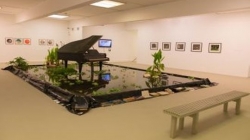
Avital Geva
Avital Geva was born in 1941 in Kibbutz Ein Shemer, lives and works in Kibbutz Ein Shemer.
The Life Achievement Award is presented to Avital Geva for his entire oeuvre, the pinnacle of which is the establishment and management of The Greenhouse at Kibbutz Ein Shemer. Avital Geva is a prominent conceptual artist who has been active since the early 1970s. After graduating from the Avni Institute in 1970, he abandoned painting and in the wake of Yitzhak Danziger, turned to the creation of radical and innovative experimental projects. In 1972 he initiated the Messer/Metzer project with his friends, the artists Moshe Gershuni, Micha Ullman, and Yehezkel Yardeni. In that project he created an impromptu local library, recycling thousands of books from the Amnir factory and scattering them in cattle troughs he had positioned between the Kibbutz and the neighboring Arab village. In 1973 he exhibited tanks containing herrings, hats, and ties at Yodfat Gallery, and in 1974 he exhibited cow tongues inside a fish tank containing formaldehyde at the Jerusalem Artists' House. He also participated in the 1970s in the conceptual museal exhibitions Concept + Information at the Israel Museum, Jerusalem (1971), Artist-Society-Artist at the Tel Aviv Museum of Art (1978), and Borders at the Israel Museum, Jerusalem (1980).
In the early 1980s he renounced his activity in the institutional art field and focused on the foundation and management of the Ein Shemer Greenhouse. The Greenhouse project is an autarkic farm as well as a utopian idea. It started its operation in 1977 as an experimental laboratory for growing cucumbers, and later evolved into a research and education center that integrates new experimentations in agriculture guided by experts and scientists, with communal and social activity, mostly of teenagers from the local kibbutzim. Throughout the years The Greenhouse housed experiments in hydroponic vegetables and houseplants growing, as well as fish farming. The agricultural developments and ecological solutions devised by the teenagers and experts at its research center are currently used by Israeli farmers for commercial agriculture. The Greenhouse is a magnet for Jewish and Arab teenagers, and the nucleus of an art and culture center that holds art, dance and creative workshops.
Despite staying away from the art world for some 15 years, in 1992 Avital Geva accepted the invitation of curator Dr. Gideon Ofrat to represent Israel in the Venice Biennale with The Greenhouse project. This exhibit, whose installation posed a tremendous challenge in itself, gained considerable international attention and extensive coverage, and is remembered to this day as one of the highlights of the Israeli exhibitions held in the framework of the Biennale.
Avital Geva's activity has challenged the perception of art and its attitude towards the social and the political and in its nascence even generated disputes and fierce objections. However, in hindsight Geva's proclaimed withdrawal from art could be construed as the expansion of its boundaries, and his activity over the last decades as a bold and original move that heralded contemporary trends in international art. Geva is a pioneer of ecological art that brings together nature, science, and culture for the creation of a new language and new concepts.
For his activity, which is a paragon of artistic radicalism, personal integrity, and social commitment, he is awarded the 2013 Life Achievement Award